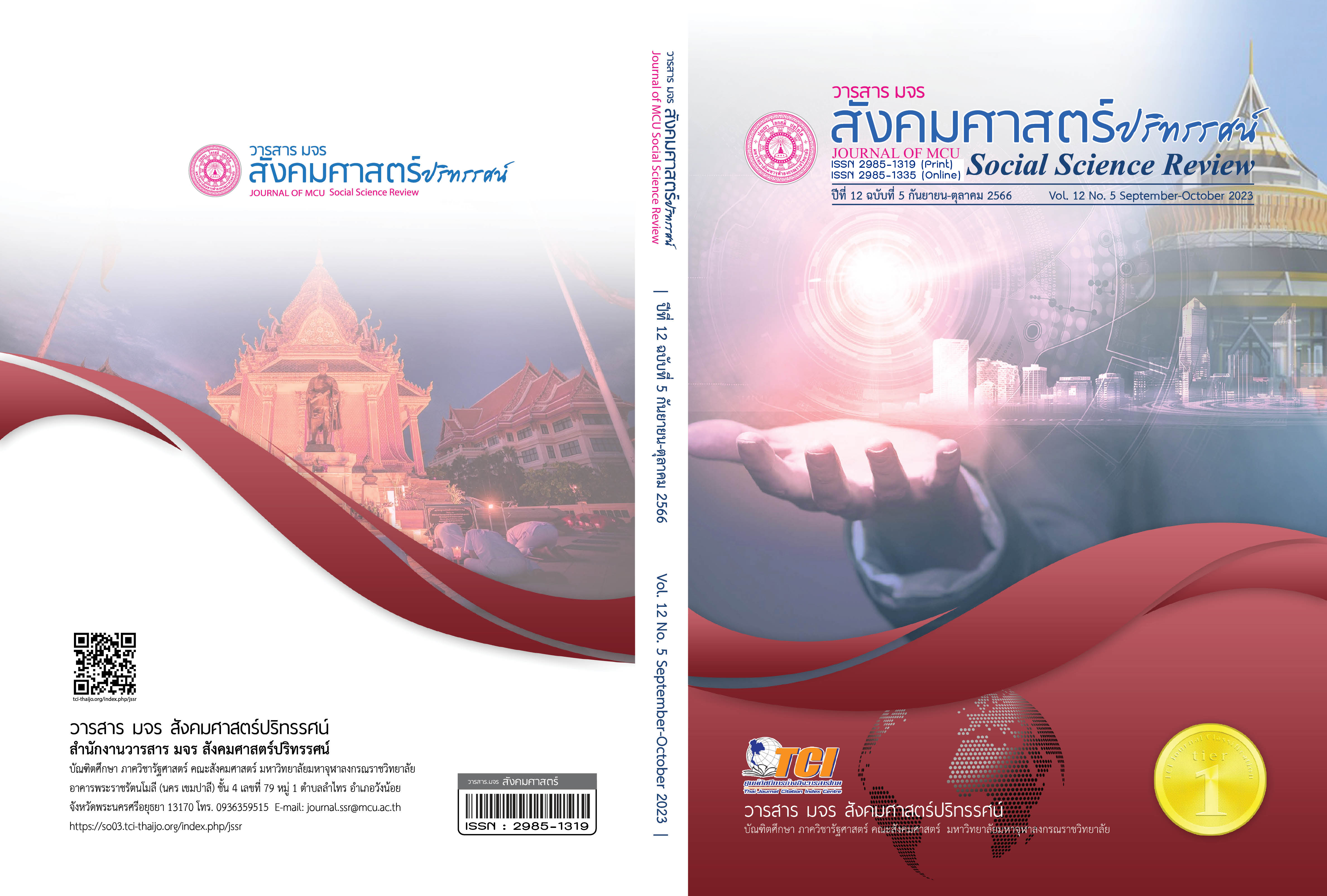การพัฒนาศักยภาพด้านการจัดการเรียนการสอนของพระสอนศีลธรรม ในโรงเรียน กรุงเทพมหานคร
คำสำคัญ:
การพัฒนาศักยภาพ, การจัดการเรียนการสอน, พระสอนศีลธรรมบทคัดย่อ
บทความวิจัยนี้มีวัตถุประสงค์ 1. ศึกษาสภาพทั่วไปของการพัฒนาศักยภาพด้านการจัดการเรียนการสอน 2. ศึกษาวิธีการพัฒนาศักยภาพด้านการจัดการเรียน และ 3. นำเสนอรูปแบบการพัฒนาศักยภาพ เป็นการวิจัยแบบผสานวิธี การวิจัยเชิงคุณภาพโดยสัมภาษณ์เชิงลึกกับผู้ให้ข้อมูลสำคัญ 18 รูป/คน และการสนทนากลุ่มเฉพาะกับผู้ทรงคุณวุฒิ 8 รูป/คน เครื่องมือที่ใช้ในการเก็บรวมรวมข้อมูลคือแบบสัมภาษณ์และแบบสนทนากลุ่มเฉพาะ วิเคราะห์ข้อมูลโดยการพรรณนาความ และการวิจัยเชิงปริมาณเก็บข้อมูลกับกลุ่มตัวอย่างจำนวน 219 รูป เครื่องมือที่ใช้ในคือแบบสอบถาม สถิติที่ใช้ในการวิเคราะห์ข้อมูลได้แก่ ค่าความถี่ ค่าร้อยละ ค่าเฉลี่ย ส่วนเบี่ยงเบนมาตรฐาน
ผลการวิจัยพบว่า 1. พระสอนศีลธรรมมีความคิดเห็นต่อสภาพการจัดการเรียนการสอนโดยรวมอยู่ในระดับมาก ด้านที่มีค่าเฉลี่ยสูงที่สุด คือ ด้านเนื้อหาและหลักสูตร รองลงมา คือด้านวิธีการสอน ด้านการใช้สื่อการสอนด้านการจัดกิจกรรมการเรียนการสอน และค่าเฉลี่ยต่ำสุด คือ ด้านการวัดและประเมินผล 2. วิธีการพัฒนาศักยภาพ ได้แก่ จัดอบรมเพิ่มเติมความรู้ พัฒนาการใช้เทคโนโลยี พัฒนามนุษย์สัมพันธ์ ส่งเสริมอบรมพัฒนากาย จัดกิจกรรมให้ร่วมมือ ฝึกอบรมสร้างความสัมพันธ์กับบุคคลอื่น ฝึกอบรมเพื่อให้รู้เท่าทันโลก 3. รูปแบบการพัฒนาศักยภาพด้านการจัดการเรียนการสอน ได้แก่ จัดศูนย์ให้ความรู้ นำเทคโนโลยีมาสร้างนวัตกรรม มีความชำนาญการใช้สื่อการสอน จัดกิจกรรมนอกห้องเรียน จัดอบรมประสิทธิภาพผู้สอน จัดประชุมเชิงปฏิบัติการ สอนให้เป็นรูปธรรม ประเมินผลตามสภาพจริง
เอกสารอ้างอิง
กองพุทธศาสนศึกษา สำนักงานพระพุทธศาสนาแห่งชาติ. (2554). คู่มือการปฏิบัติงานการขอจัดตั้งสำนักปฏิบัติธรรม. กรุงเทพฯ: โรงพิมพ์สำนักงานพระพุทธศาสนาแห่งชาติ.
พระกิตติศักดิ์ ธีรปญฺโญ (เจริญสุข). (2561). บทบาทของพระสอนศีลธรรมในการจัดการเรียนการสอนวิชาพระพุทธศาสนา ระดับมัธยมศึกษา อำเภอบางน้ำเปรี้ยว จังหวัดฉะเชิงเทรา. (วิทยานิพนธ์ปริญญาพุทธศาสตรมหาบัณฑิต สาขาวิชาการสอนสังคมศึกษา). พระนครศรีอยุธยา: มหาวิทยาลัยมหาจุฬาลงกรณราชวิทยาลัย.
พระครูเกษมสุทธิคุณ สนฺตจิตฺโต. (2557). พุทธวิธีการสอนเชิงบูรณาการให้ผู้เรียนมีส่วนร่วม. วารสารครุศาสตร์ปริทรรศน์, 1(2), 160-169.
พระครูเนกขัมมธรรมธาร (มนูญ จารุวณฺโณ) และคณะ. (2564). รูปแบบการจัดการเรียนการสอนของพระสอนศีลธรรมในโรงเรียนจังหวัดชุมพร. วารสาร มจร สังคมศาสตร์ปริทรรศน์, 11(1), 291-304.
พระครูปลัดเมธาลักษณ์ ฐิตโสภโณ (หงษ์โสภา). (2561). บทบาทพระสอนศีลธรรมในโรงเรียนประถมศึกษา อำเภอเมือง จังหวัดสมุทรปราการ. (วิทยานิพนธ์ปริญญาพุทธศาสตรมหาบัณฑิต สาขาพุทธบริหารการศึกษา). พระนครศรีอยุธยา: มหาวิทยาลัยมหาจุฬาลงกรณราชวิทยาลัย.
พระเทพคุณาภรณ์ (โสภณ โสภณจิตฺโต) และคณะ. (2565). การพัฒนาศักยภาพการบริหารจัดการศาสนสมบัติของวัดในกรุงเทพมหานคร. วารสาร มจร สังคมศาสตร์ปริทรรศน์, 12(4), 53-62.
พระปลัดธนากร สนฺตมโน (เพราะถะ). (2558). ศึกษาสมรรถนะการสอนศีลธรรมตามความคิดเห็นของครู สังกัดสำนักงานเขตพื้นที่การศึกษาประถมศึกษาเลย เขต2. (วิทยานิพนธ์ปริญญาพุทธศาสตรมหาบัณฑิต สาขาวิชาพระพุทธศาสนา). พระนครศรีอยุธยา: มหาวิทยาลัยมหาจุฬาลงกรณราชวิทยาลัย.
พระมหาปัญญา แล่นปิว. (2553). ศึกษาและปฏิบัติงานของพระสอนศีลธรรมในโรงเรียน สังกัดสำนักงานเขตพื้นที่การศึกษา กรุงเทพมหานคร เขต 2. (วิทยานิพนธ์ปริญญาการศึกษา มหาบัณฑิต สาขาการบริหารการศึกษา). กรุงเทพมหานคร: มหาวิทยาลัยศรีนครินทรวิโรฒ.
พระมหาสราวุธ สราวุโธ (แสงสี). (2562). การพัฒนาศักยภาพพระสอนศีลธรรมในโรงเรียนมัธยมศึกษาตอนปลายในเขตปกครองคณะสงฆ์ภาค 15. (ดุษฎีนิพนธ์ปริญญาพุทธ ศาสตรดุษฎีบัณฑิต สาขาวิชาการจัดการเชิงพุทธ). พระนครศรีอยุธยา: มหาวิทยาลัย มหาจุฬาลงกรณราชวิทยาลัย.
สุเทพ เชื้อสมุทร. (2556). รูปแบบการพัฒนาสมรรถนะพระสอนศีลธรรมในโรงเรียนมัธยมศึกษา. (ดุษฎีนิพนธ์ปริญญาปรัชญาดุษฎีบัณฑิต สาขาบริหารการศึกษา). กรุงเทพฯ: มหาวิทยาลัยศรีปทุม.
Yamane, T. (1967). Statistic: An Introductory Analysis. New York: Harper and Row.
ดาวน์โหลด
เผยแพร่แล้ว
รูปแบบการอ้างอิง
ฉบับ
ประเภทบทความ
สัญญาอนุญาต
ลิขสิทธิ์ (c) 2023 วารสาร มจร สังคมศาสตร์ปริทรรศน์

อนุญาตภายใต้เงื่อนไข Creative Commons Attribution-NonCommercial-NoDerivatives 4.0 International License.
เพื่อให้เป็นไปตามกฎหมายลิขสิทธิ์ ผู้นิพนธ์ทุกท่านต้องลงลายมือชื่อในแบบฟอร์มใบมอบลิขสิทธิ์บทความให้แก่วารสารฯ พร้อมกับบทความต้นฉบับที่ได้แก้ไขครั้งสุดท้าย นอกจากนี้ ผู้นิพนธ์ทุกท่านต้องยืนยันว่าบทความต้นฉบับที่ส่งมาตีพิมพ์นั้น ได้ส่งมาตีพิมพ์เฉพาะในวารสาร มจร สังคมศาสตร์ปริทรรศน์ เพียงแห่งเดียวเท่านั้น หากมีการใช้ภาพหรือตารางหรือเนื้อหาอื่นๆ ของผู้นิพนธ์อื่นที่ปรากฏในสิ่งตีพิมพ์อื่นมาแล้ว ผู้นิพนธ์ต้องขออนุญาตเจ้าของลิขสิทธิ์ก่อน พร้อมทั้งแสดงหนังสือที่ได้รับการยินยอมต่อบรรณาธิการ ก่อนที่บทความจะได้รับการตีพิมพ์ หากไม่เป็นไปตามข้อกำหนดเบื้องต้น ทางวารสารจะถอดบทความของท่านออกโดยไม่มีข้อยกเว้นใดๆ ทั้งสิ้น





